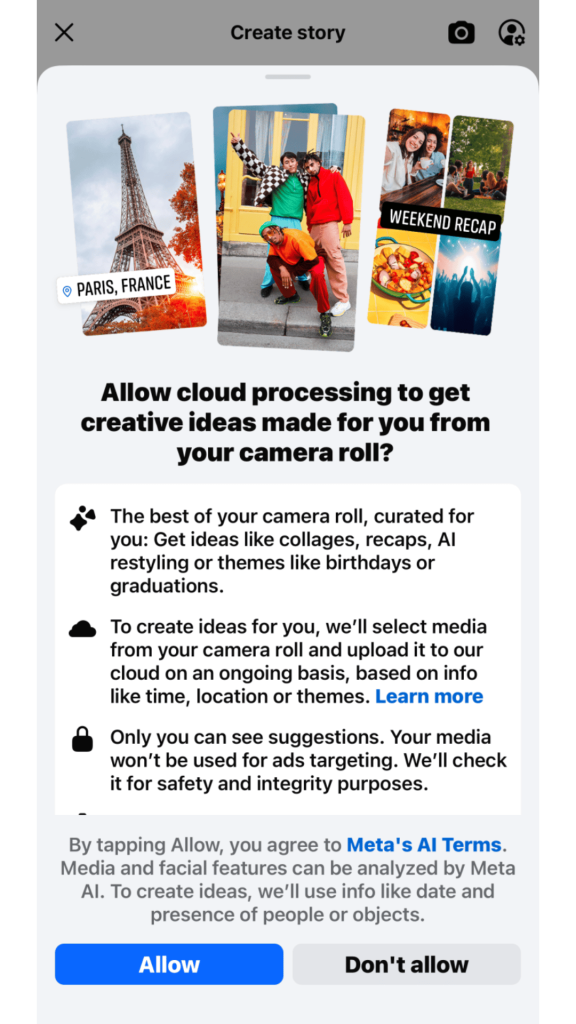Facebook wants to look at your entire camera roll for “AI restyling” suggestions, and more
July 1, 2025
Facebook’s pursuit of your personal data continues apace, and now it has a new target: photos on your phone that you haven’t shared with it yet.
Techcrunch reports that the social media giant is now asking its users to peek at the photos on their phones’ camera rolls. In return it will give them new ideas to view their photos.
In a pop-up message seen by some of the site’s users, Facebook asks users to “allow cloud processing” of the photos in their camera roll. “To create ideas for you, we’ll select media from your camera roll and upload it to our cloud on an ongoing basis, based on info like time, location or theme,” the message says.

The site will then offer things like collages, recaps, AI restyling or themes like birthdays or graduations, it continues, adding that Facebook won’t use the photos to target you for ads.
But what else might Meta do with those photos? Its AI terms of service allow it to analyze the images you load using AI, “including facial features”.
Incidentally, you can’t share any images with Meta that contain images of people in Illinois or Texas unless you’re legally authorized to consent on their behalf, it warns. That’s likely because both those states have strict laws around the use of biometric data, including facial recognition, in photos. We’re not sure how that works, then, if you grant the company unfettered access to your camera roll which includes photos of your trip to Chicago or Austin to visit friends and family.
Another question is over whether the company will scan children’s images. If you have an aversion to sharing your kids’ photos on Facebook, this could be a real issue.
We can extend this into even more worrying areas. What if you have photos of your kids in the bath that you don’t want an AI to train on? Or if you have intimate photos of yourself or a partner on your phone?
Facebook reserves the right to subject any content to “automated or manual (i.e. human) review and through third-party vendors in some instances”. There’s nothing in Meta’s messaging that seems to stop it from subjecting your camera roll photos to this.
Facebook has made camera roll cloud processing an opt-in service, meaning that you must deliberately select it for the app to start scanning your camera roll. However, this wasn’t enough for at least one Reddit commenter, who warned that you can’t control your photos once you share them with others.
“So although I always uninstall Facebook and Instagram, if I share a photo of me with my family, Meta will still get to analyze it, because at least one of them will still have those apps installed,” they said. In general, reactions to the story seem negative.
Facebook isn’t the only company that allows you to automatically upload your photos to the cloud. Apple offers this as part of its tightly integrated photos service, and has been producing montages and other assets from its users’ photos for a long time.
Apple says that it only uses AI to analyze your photos on your local device, and while it stores them in the cloud it doesn’t access them there. However it also says that it has “a worldwide, royalty-free, perpetual, nonexclusive license to use the materials you submit within the Services and related marketing as well as to use the materials you submit for Apple internal purposes.” Those services include iCloud+. iCloud is the cloud service that stores your photos.
Google, which also allows you to automatically upload photos to its service, says that you own your photos but retains the right to modify and create derivative works on your content, and to share it with contractors.
Google’s past relationship with photo users has been problematic. It once deleted a dad’s account after he took an image of his son’s groin to send to a doctor and it was automatically uploaded to the cloud, where Google identified it as child sexual abuse material. Law enforcement considered him innocent. Google refused to reinstate his services.
Our advice? If you’re going to allow a service to automatically analyze the photos you take, be sure that you completely trust that service. Check to see if it has been accused of mishandling users’ data in the past, such as Meta was here, here, and of course here.
That’s not enough, though. Be careful who else you share your photos with, and under what circumstances. If you do share them, do so only with those you trust. Include a caveat to ensure that they know how you’re comfortable with them using those photos, and what you’re not OK with them doing.
We don’t just report on threats – we help protect your social media
Cybersecurity risks should never spread beyond a headline. Protect your social media accounts by using Malwarebytes Identity Theft Protection.
Search
RECENT PRESS RELEASES
Related Post
